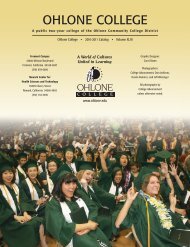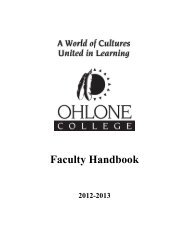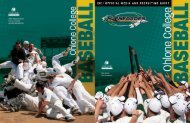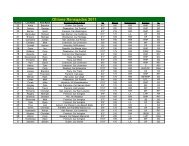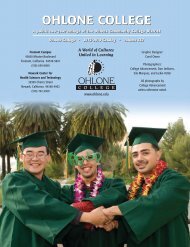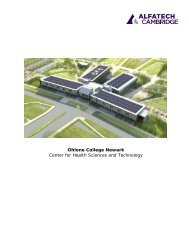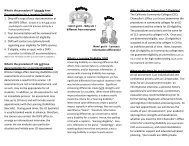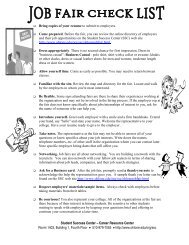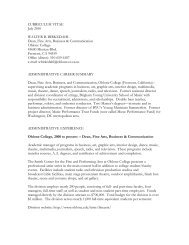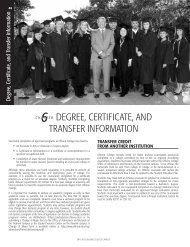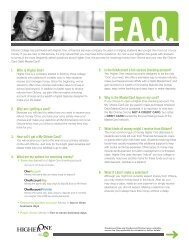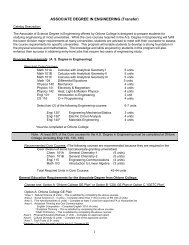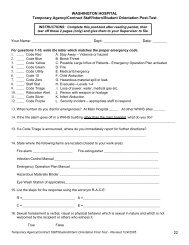2012-2013 Catalog (all pages) - Ohlone College
2012-2013 Catalog (all pages) - Ohlone College
2012-2013 Catalog (all pages) - Ohlone College
You also want an ePaper? Increase the reach of your titles
YUMPU automatically turns print PDFs into web optimized ePapers that Google loves.
76 7 CURRICULUM GUIDES<br />
MAJOR FIELD<br />
ECS-300 Principles and Practices of Teaching Young Children 4<br />
ECS-301 Childhood Growth and Development 3<br />
ECS-302 Introduction to Curriculum 4<br />
ECS-303 Child, Family, and Community 3<br />
ECS-304 Observation and Assessment of Children 4<br />
ECS-305 Health Safety and Nutrition 3<br />
ECS-306 Guidance and Discipline of Young Children 3<br />
ECS-307A4, B4, or C4 Practicum – Field Experience 4<br />
SUPPORTING COURSES<br />
Select 6-8 additional units in Early Childhood Studies to complete Major Field<br />
requirement. For an option, select from the categories provided.<br />
ECS-308 Administration of Programs for Young Children 3<br />
ECS-309 Teaching in a Diverse Society 3<br />
ECS-310 Music and Movement Curriculum for Young Children 3<br />
ECS-311 Art for the Young Child 3<br />
ECS-312 The Development of Literacy in<br />
Early Childhood Education 3<br />
ECS-313 Science and Math Curriculum for Young Children 3<br />
ECS-314 Literature for the Young Child 3<br />
ECS-316 Children with Special Needs in<br />
Programs for Young Children 3<br />
ECS-317 Infant and Toddler Development and Care 3<br />
ECS-320 Introduction to Family Child Care Homes 1<br />
ECS-321 Supervision in Early Childhood Programs 3<br />
ECS-322 Mentoring and Supervision in Early Childhood Programs 2<br />
ECS-323 Advanced Training in Infant-Toddler Care 3<br />
ECS-324 Parenting 3<br />
ECS-327 School Age Child Development 3<br />
ECS-328 Curriculum for the School Age Child 3<br />
ECS-330 Second Helping for Family Childcare Providers 2<br />
28<br />
Total Required Units: 34-36<br />
ECS OPTIONS<br />
The following options meet the requirements of the Commission on Teacher<br />
Credentialing for a specialization. To meet the Master Teacher requirements<br />
students must complete six units in a specialized field and complete ECS-322,<br />
Mentoring and Supervision in Early Childhood Programs.<br />
The State of California, Commission on Teacher Credentialing, requires a<br />
specialization of 6-8 units in a specific area to meet the qualifications for the<br />
Master Teacher level of the Child Development Permit. These options have<br />
been designed to meet the needs reflected by the community. Students may<br />
create their own specialization. Check with the ECS Professional Development<br />
Coordinator at (510) 979-7496 for information.<br />
Family Child Care<br />
ECS-320 Introduction to Family Child Care Homes 1<br />
ECS-324 Parenting 3<br />
ECS-330 Second Helping for Family Childcare Providers 2<br />
Infant and Toddler<br />
ECS-317 Infant and Toddler Development and Care 3<br />
ECS-323 Advanced Training in Infant-Toddler Care 3<br />
Administrative (Required for Site Supervisor and Program Directors)<br />
ECS-308 Administration of Programs for Young Children 3<br />
ECS-321 Supervision in Early Childhood Programs 3<br />
ECS-322 Mentoring and Supervision in Early Childhood Programs 2<br />
(continued on next column)<br />
Family and Community Partnership<br />
ECS-309 Teaching in a Diverse Society 3<br />
Creative Activities<br />
ECS-310 Music and Movement Curriculum for Young Children 3<br />
ECS-311 Art for the Young Child 3<br />
ECS-312 The Development of Literacy in<br />
Early Childhood Education 3<br />
ECS-313 Science and Math Curriculum for Young Children 3<br />
ECS-314 Literature for the Young Child 3<br />
Working with Special Needs<br />
ECS-304 Observation and Assessment of Children 4<br />
ECS-316 Children with Special Needs in<br />
Programs for Young Children 3<br />
School Age Programs<br />
ECS-327 School Age Child Development 3<br />
ECS-328 Curriculum for the School Age Child 3<br />
ENGINEERING<br />
Associate in Science in Engineering<br />
The Associate in Science in Engineering offered by <strong>Ohlone</strong> <strong>College</strong> is designed<br />
to prepare students for studying engineering at most universities. The core<br />
courses required in the Associate in Science in Engineering will fulfill the lower<br />
division requirements for most campuses of the UC and CSU systems. This<br />
program will enable students to develop a strong foundation in engineering,<br />
physics, and mathematics. Furthermore, the theoretical knowledge and<br />
laboratory skills acquired by students in this program will also enhance their<br />
success with obtaining entry-level jobs that require two years of college-level<br />
science and math.<br />
Since some curriculum requirements may vary among transfer universities, it is<br />
imperative that students entering <strong>Ohlone</strong>’s Associate in Science degree program<br />
in Engineering meet with a counselor at the start of their academic work.<br />
Counselors will assist students in preparing a Student Education Plan that will<br />
prepare them to transfer to the university of their choice. Counselors will also<br />
advise students on the general education plan that best prepares them for<br />
future transfer.<br />
REQUIREMENTS FOR ASSOCIATE IN SCIENCE DEGREE<br />
a) Complete the Major Field courses with a grade of C or better.<br />
b) Complete Plan A, B, or C General Education requirements. These<br />
requirements are specified in the <strong>Ohlone</strong> <strong>College</strong> catalog.<br />
c) Complete at least 60 degree-applicable units with a 2.0 grade point average.<br />
d) Complete at least 12 units at <strong>Ohlone</strong> <strong>College</strong>.<br />
e) Complete at least 50% of the Major Field courses at <strong>Ohlone</strong> <strong>College</strong>.<br />
f) Complete ENGI-120, ENGI-130, and ENGI-140 at <strong>Ohlone</strong> <strong>College</strong>.<br />
STUDENT LEARNING OUTCOMES<br />
1. Employ general principles, theories, concepts, and/or formulas in the<br />
solution of problems.<br />
2. Conduct engineering lab projects, use laboratory materials properly and<br />
safely, carefully note results in an engineering project report, and describe<br />
the results clearly for others.<br />
3. Participate effectively as team members in group projects: working<br />
cooperatively with others, accepting diverse views, encouraging active<br />
participation of others, dealing productively with conflict, and taking<br />
leadership roles as the need arises to accomplish the group’s objective.<br />
4. Demonstrate the ability to use modern engineering tools necessary for<br />
engineering practice.<br />
5. Demonstrate an understanding of the engineering profession.<br />
(continued on next page)<br />
<strong>2012</strong>-<strong>2013</strong> OHLONE COLLEGE CATALOG



